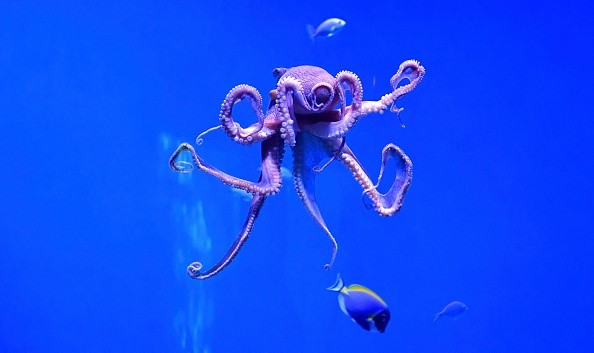Recent research conducted a successful recording of brain activity and waves of a free-moving octopus.
The study will help observe the intelligence and behavior of the sea creature.
The study title is Recording Electrical Activity from the Brain of Behaving Octopus, with the study findings published in the Current Biology journal.
Researchers said it is considered the first recording from a free-moving octopus using electrodes implanted into the octopus's brain and using a data logger.
Observing octopus behavior and intelligence

The study report can also be read on the Phys.org website.
The report said that they looked into the Octopus cynea as an ideal model for the study.
According to the Animal Diversity Web website, Octopus cynea is also known as the big blue octopus, thriving in arts of the Red Sea, Hawaiian Islands, and Indian and Pacific Oceans.
The report added that the species of octopus could live in sandy, rocky or muddy beds or bodies of water.
They grow fast, but their life span is short-lived, reaching 12 to 15 months.
The species are also known as diurnal hunters, moving from one den to another.
According to the report, Dr. Tamar Gutnick explained the importance of octopus in studying the brain.
Dr. Tamar is also the study's first author.
Meanwhile, the study published in Current Biology added that octopuses are considered intelligent invertebrates with eight noticeable arms.
Dr. Tamar added that octopuses have a large brains, showing advanced cognitive abilities that become ideal for research and observation.
The research explained that measuring the brainwaves from a moving octopus is challenging.
The researchers had to ensure that the mechanism or equipment would not disturb the octopus because it could remove it from its body.
So what do the researchers do?
Although octopus could become elusive, the report added that researchers designed comfortable and small data loggers.
The equipment is considered lightweight and waterproof, mainly because the octopus stays underwater.
The study explained that the process became essential in observing and understanding an octopus's unique behavior and brain system.
After the researchers inserted the equipment, they began to monitor the octopus activity after resting for about 12 hours.
The study concluded that they observed brain activity and noticeable patterns that seemed the same with other mammals.
Meanwhile, the researchers said the same process could be done to other free-moving octopuses.
Part of the steps is to unlock the brain activity patterns found in the video.
More facts about octopuses
Meanwhile, the National History Museum's website explained that octopuses are very clever.
- Octopuses have eight arms. Part of the arm has its brain that makes the octopus react and function faster.
- The report added that octopuses are equipped with amazing optic lobes, showing significant to recognize objects.
Furthermore, Nature World News (NWN) and a recent US Department of the Interior post revealed a giant Pacific Octopus swimming across the tidepools in Northwestern Oregon.
Luke Smith from the Bureau of Land Management managed to film the agile giant Pacific octopus.
For more similar stories, don't forget to follow Nature News.
© 2025 NatureWorldNews.com All rights reserved. Do not reproduce without permission.





